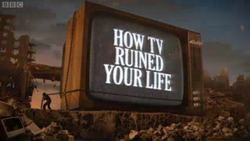| How TV Ruined Your Life | |
|---|---|
 Title card | |
| Genre | Satire |
| Written by | Charlie Brooker |
| Presented by | Charlie Brooker |
| Country of origin | United Kingdom |
| Original language | English |
| No. of series | 1 |
| No. of episodes | 6 (list of episodes) |
| Production | |
| Executive producer | Annabel Jones |
| Running time | 30 minutes |
| Production company | Zeppotron |
| Original release | |
| Network | BBC Two |
| Release | 25 January – 8 March 2011 |
How TV Ruined Your Life is a British satirical television series written and presented by Charlie Brooker. [1] Brooker, whose earlier TV-related programmes include How to Watch Television, Charlie Brooker's Screenwipe and You Have Been Watching , examines how the medium has bent reality to fit its own ends. Produced by Zeppotron, the series aired its first episode in January 2011. [1]